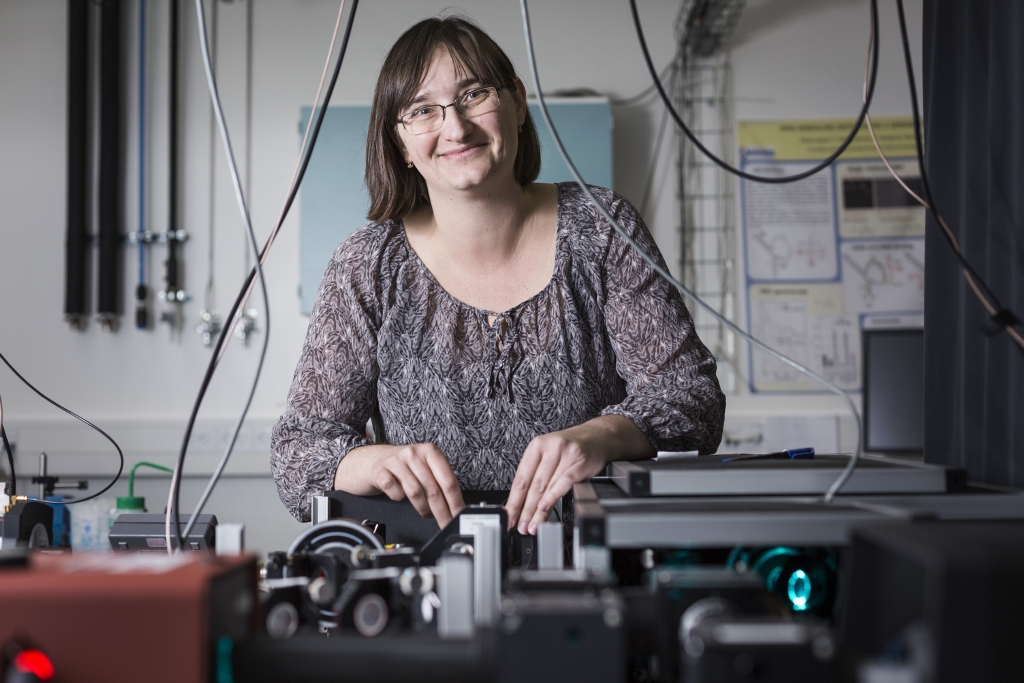DKK 12.7 m for studies of the dynamics and functionality of a single molecule in its natural environment
Associate Professor Victoria Birkedal has received a grant from the Novo Nordisk Foundation with which she will be able to establish Aarhus single molecule fluorescence infrastructure (ASiMoF) for advanced studies of molecular structure, dynamics and function in nano- and bio-systems.

Biological processes are the result of complex choreographies of biomolecules. Knowledge about this molecular dance is essential for understanding biology in health and disease. While our understanding of biomolecules has advanced in leaps, it remains mostly built on static pictures. But processes often depend on rare molecular configurations or dynamics that are blurred or lost in the average picture.
Light from molecular beacons to study movements of single molecules
The Aarhus single molecule fluorescence infrastructure (ASiMoF) will go beyond traditional approaches and static images to unravel the molecular dance of biomolecules by studying their individual behavior. This will be possible by using light emitted from molecular beacons attached to the biomolecules in a manner that enables single molecule imaging in complex environments – even within cells – with a time resolution matching that of typical dance moves of biomolecules.
New insights into molecular structure and function in nano- and bio-systems
The new single molecule fluorescence facilities will give Aarhus University the opportunity, to study molecular conformations, interactions, dynamics and localization in different environments, such as in solution, on surfaces and in cells. Single molecule fluorescence provides quantitative information on molecular movement on a broad range of length and time scales. ASiMoF will yield the missing bridge between detailed structural tools such as CryoEM or NMR and images e.g. obtained by live cell imaging with standard fluorescence microscopes.
Integrating local powerful microscopy infrastructures provide detailed molecular information
ASiMoF has a strong interdisciplinary core team of scientists from chemistry, molecular biology and nanoscience. Together with existing local fluorescence microscopy equipment and knowhow, the new infrastructure will provide vital molecular information on length scales ranging from only a few nm to several 100s of mm, which is complementary to, but unattainable by existing infrastructure.
Concurrently it will provide an ideal training ground for a new generation of scientists, who will integrate these approaches into their own R&D. It will also bring interesting possibilities for private companies for their corporate research.
Professor Poul Nissen, Department of Molecular Biology & Genetics and iNANO, and colleagues has also received a grant to establish an infrastructure for Cryo-Electron Tomography (ICE-T). Read more about this infrastructure here.
About the Novo Nordisk Foundation’s grants for Research Infrastructure – Large equipment and facilities
With the Research Infrastructure Programme, the Novo Nordisk Foundation wishes to strengthen the Danish research environment within biomedicine, biotechnology, and natural and technical sciences by supporting the establishment and maintenance of infrastructures needed to achieve excellence in research and innovation.
The goal of the research programme is to: ensure that researchers have access to state-of-the-art research facilities, ensure that potential users have access to qualified technical assistance, ensure that the facilities and/or equipment is continuously developed and maintained, boost the nearby research environment.
Read the press release from the Novo Nordisk Foundation here.
For further information, please contact
Associate Professor Victoria Birkedal
Department of Chemistry/iNANO
Aarhus University, Denmark
vicb@inano.au.dk – +45 2899 2295
